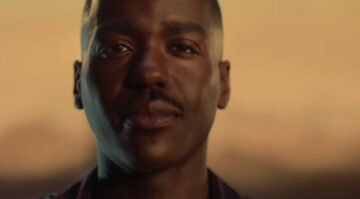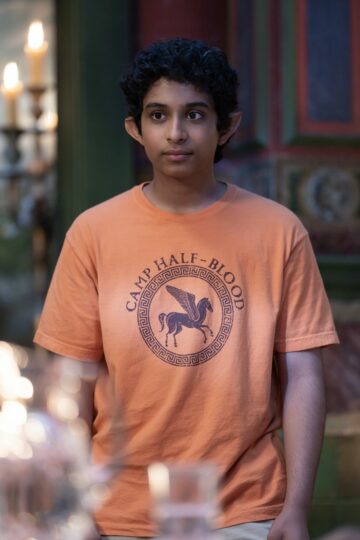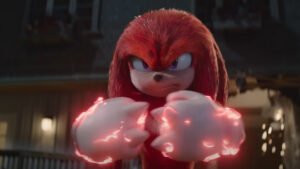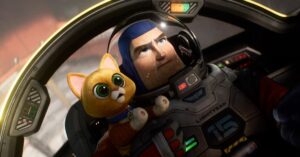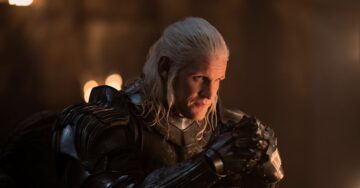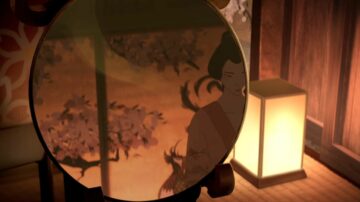Season 2 of HBO’s pirate comedy/romance Our Flag Means Death takes some big turns by episode 7 — maybe not as big as the season 1 turn, when inept pirate captain Stede Bonnet (Rhys Darby) and Ed “Blackbeard” Teach (Taika Waititi) realized they had romantic feelings for each other, but still… a whole lot of things happen that we figured viewers would want to talk about, once they’d seen it for themselves. So when Polygon sat down with creator and showrunner David Jenkins to talk about season 2, we split the conversation into two parts: an overview of the season’s biggest ideas, and this spoiler-focused conversation about all the surprises in episode 7, including its explosive ending.
[Ed. note: Read on at your own risk; spoilers abound ahead.]
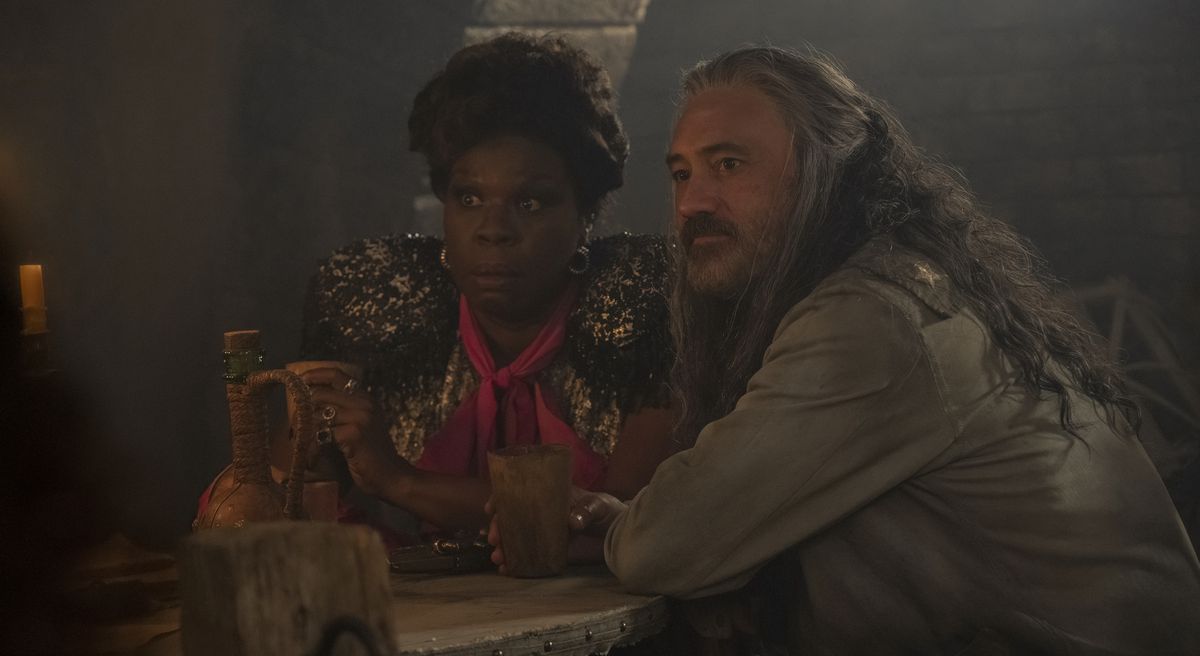
To recap: In episode 7 of Our Flag Means Death season 2, Stede and Blackbeard have just had sex for the first time, and they seem all set for their happily-ever-after together — until Blackbeard abruptly leaves Stede to pursue a job as a fisherman. The crew visits the Republic of Pirates, where Oluwande (Samson Kayo) expresses feelings for Zhang Yi Sao (Ruibo Qian), even though he was previously uncomfortable with her expressing feelings for him when she took over his ship, and even though he and his friend Jim (Vico Ortiz) had a romantic liaison in season 1. They also learn that The Swede (Nat Faxon) has happily settled in as one of 20 husbands to Spanish Jackie (Leslie Jones), even though he was forced into that relationship to save the rest of the crew.
Yes, that summary does sound like something out of a soap opera, now that you mention it. But this doesn’t: At the end of the episode, a trap set by Prince Ricky (Erroll Shand) obliterates Zhang’s fleet, and the pirates’ haven is destroyed when the English fleet sweeps in to kill or capture the whole cast. Jenkins talks us through it all below.
This conversation has been edited for concision and clarity.
Polygon: One thing that really surprised me in season 2 is that you have two different coercive relationships where a man is being uncomfortably forced into an intimate relationship with a woman, and then he later decides he likes it. What kind of conversations went into those relationships and the gender tropes you’re reversing there?
David Jenkins: With The Swede and Spanish Jackie — she owns [her husbands]. They live in her basement, and she owns them, basically. So already, you’re [ick noise]. But then I love that The Swede really likes her. She’s a gangster, she’s a mob boss. There is a gender aspect to having her in that role. But then he says, “I’ve found parts of myself that I never knew existed, and other parts I thought were long gone.”
I just liked the idea of Leslie [Jones]’s character and Nat Faxon’s character being together and happy, balancing each other. She’s already got a wild thing going — she’s got 20 husbands. To me, to see that relationship start as kind of a joke, Oh, Leslie’s character’s scary and his character’s timid, and it turns into No, actually, they balance each other pretty well — that’s kind of sweet. It’s less about the fact that she essentially owns him, it’s about the fact that they do care about each other. It’s kind of nice.
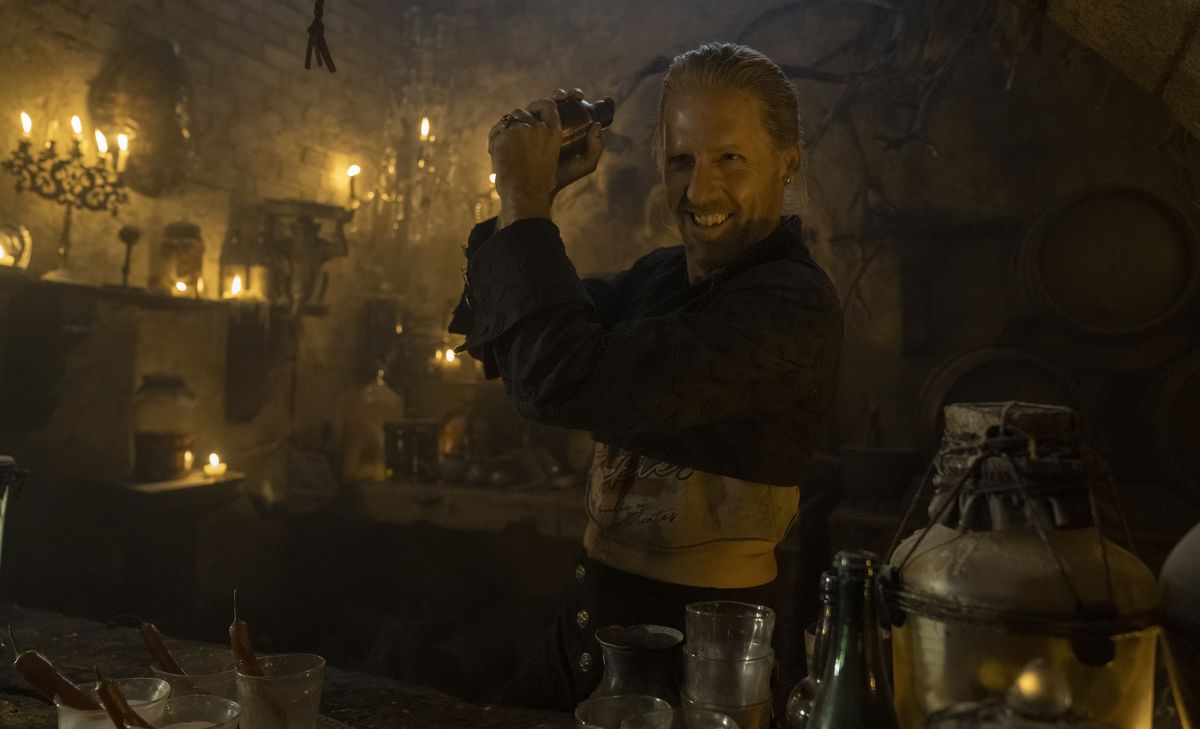
But you have very much the same dynamic with Zhang and Olu. When they start out, she’s got all the power in the relationship, and she’s kind of predatory about claiming Olu. He’s intimidated and forced into it, and he comes around on deciding he likes her. It just feels like an odd beat to repeat.
Well, she has all the power in the relationship until she doesn’t. And then she realizes that she’s in love with this guy — he is soft and kind and sweet. And that’s powerful. I think they’re mirrored in Blackbeard and Stede’s relationship — they’re each each other’s manic pixie dream girl.
I think there is something in the show about how piracy is a brutal way of life. It’s essentially Mad Max, this world. There’s no law, there’s just strong and weak. And in stories like Game of Thrones, we see how that plays out. It’s a lot of women getting raped in stories and you’re like, [resigned ick noise]. In Our Flag, a lot of these relationships aren’t consenting relationships — they’re power-dynamic relationships, because it’s Mad Max. So a thing I like to see in this show is, Well, why is the more powerful person interested in this weaker person? What are they trying to balance?
In a world where might makes right, and some people just need to align themselves with someone strong, it’s interesting to be like, Well, what does Blackbeard need? What does Spanish Jackie need? What does Zhang Yi Sao need, the most powerful pirate in the world? What happens when she gets into a relationship? What is she looking for? She’s a modern person, what does she need? So you’re always gonna get those weird power dynamics to start with, I think, and then you just try to get to: What’s underneath that? Why are they doing what they’re doing? What are they looking for?
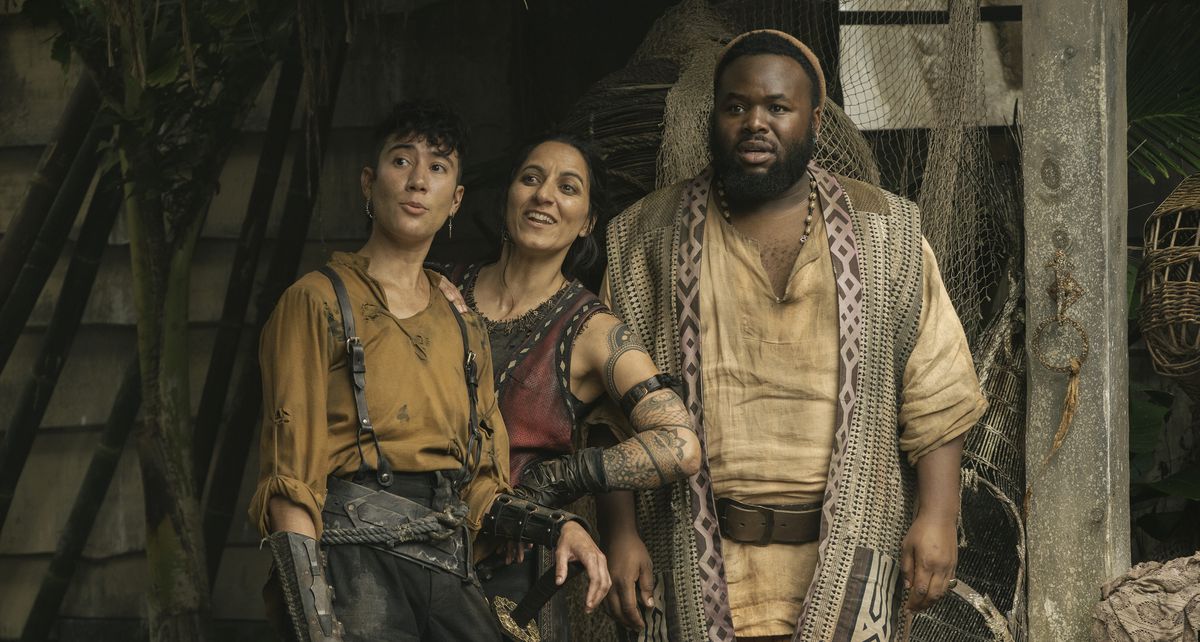
Speaking of what Blackbeard needs, I think some fans will think that him leaving Stede in episode 7 is a form of revenge. It so closely parallels what Stede did to him. You can read it as them being very much alike, running from commitment, or as him trying to hurt Stede. What do you want to say to people freaking out after episode 7?
Well, there’s a thing I talk about a lot — I really, really liked the Bradley Cooper/Lady Gaga version of A Star Is Born. I like how the dynamic changes between them. Everything we do is collapsed on this show — we talk about these lofty things, but we don’t have the time to execute everything we might like to do. Like, episode 4 is a mini Who’s Afraid of Virginia Woolf?, just a very small version of it.
In this case, we liked the idea that Blackbeard found this guy and made him a legitimate pirate, but now that he’s a star, Blackbeard’s questioning what he wants to do now that he’s lost his appetite for piracy. And Stede’s turned into Lady Gaga’s character. He’s famous now, because he killed the scariest pirate, so that power is inverted. It’s interesting to look at how a relationship changes now that Blackbird isn’t the star anymore and Stede isn’t a hanger-on. Stede got what he wanted; he’s a real boy. Is Blackbeard jealous? Is he uncomfortable with it? When power dynamics shift in a relationship, that leads to trouble. And then it really is just like, What are they going to do? Are they going to make it through it? Can they rebalance? Because that is a sign of a healthy relationship.
That episode is also a big turning point for Zhang and Olu, and for Olu and Jim. What went into the decisions around them moving in different directions after their connection in season 1?
I think that relationship was always seen in the room as a friend relationship that got romantic. That tension was interesting to us — it’s like, Well, what if we don’t play them as jealous? What if we play it as, when you love a friend and it becomes romantic, and then you see someone who makes them happy and you know you’re not it, you feel jealous? But also, they’re your friend. You want to see them happy. I think a lot of times, particularly in straight relationships, it’s traumatizing, and could be more about the jealousy. But here, I think it’s nice to see it this way: They truly care about each other enough to just want to see their friend with someone good, someone who takes care of them. In my life, those are the best relationships [with exes]. I do see those among my friends, but I don’t see it dramatized a lot, I just see the negative component dramatized. I like it this way — they’re friends, and they just want to see each other do well.
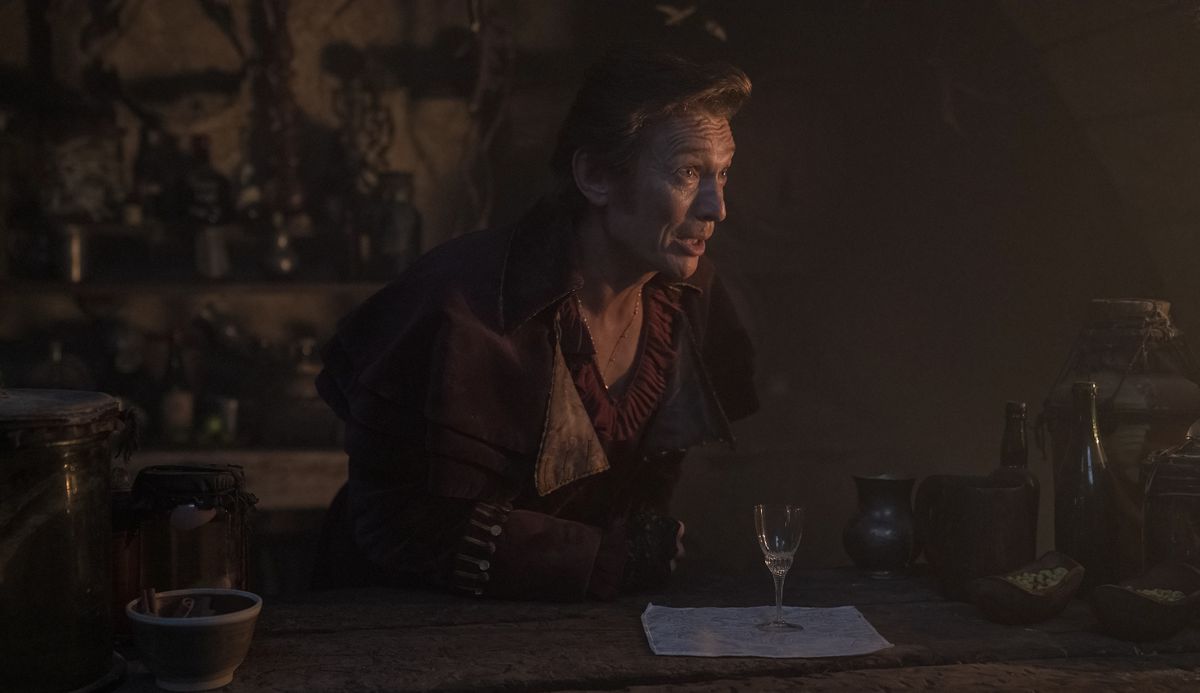
This has never really been a show about villains, but the end of episode 7 feels like a shift in that regard.
I think a lot of the internal forces in Our Flag are the villains. It’s like, Can you let yourself be loved? Do you know what you want in love? If you know what you want, are you healthy enough to get it? When you start going into the tropes of [Blackbeard impression] Oh, should I be gay or not? or Oh, my friends did me dirty — we’ve seen that a lot. It’s good dramatic fuel, but I don’t think those are the things that drive the show.
I think the things that drive this show are a bunch of people who care about each other and are trying to figure out how to have relationships. And relationships are hard. Usually, you’re your own bad guy or gal or person in a relationship. It’s rarely [someone] doing something terrible to you — it’s you just trying to figure out your own shit. Hopefully, your friends help.
The big ending of episode 7 does suggest, though, that there might be more outside pressure coming to the cast, even if it’s just a short-term blip.
I think this is a story about the age of piracy coming to an end. This way of life is coming to an end. And every Western that’s good is that story: This way of life we made is coming to an end, and it can’t last. […] I think every story about outlaws is about trying to preserve a way of life against normative forces that are kind of fascistic.
All of which is a big historical moment, as far as the history of piracy, and it’s part of Stede and Blackbeard’s real-life story. Was that element coming in from history, the way you took little parts of Stede and Blackbeard’s relationship from history?
Using historical beats are good, because they give the story some shape — until they’re not useful, and then you just ignore them. When you feel like you’d rather eat a sandwich, just ignore the history. And then when you feel like, OK, we’re in emotional soup here, we need some downward pressure, then you bring history back in. The balance of the show is 90% ignoring history, and then 10%, bring it in, whenever we’re like, Ah, gotta move the story forward! Remember, the English are out there, and they’re really bad!
The season 2 finale of Our Flag Means Death airs on Max on Oct. 26.
- SEO Powered Content & PR Distribution. Get Amplified Today.
- PlatoData.Network Vertical Generative Ai. Empower Yourself. Access Here.
- PlatoAiStream. Web3 Intelligence. Knowledge Amplified. Access Here.
- PlatoESG. Carbon, CleanTech, Energy, Environment, Solar, Waste Management. Access Here.
- PlatoHealth. Biotech and Clinical Trials Intelligence. Access Here.
- Source: https://www.polygon.com/23924316/our-flag-means-death-spoiler-discussion-david-jenkins-interview-stede-blackbeard
- 1
- 20
- 26
- 7
- a
- About
- actually
- afraid
- after
- Against
- age
- ahead
- align
- alike
- All
- already
- also
- always
- among
- an
- and
- anymore
- appetite
- ARE
- around
- as
- aspect
- At
- back
- bad
- balance
- balancing
- bar
- BE
- beat
- because
- becomes
- been
- being
- below
- BEST
- between
- BIG
- Biggest
- Black
- bring
- Bunch
- but
- by
- CAN
- capture
- care
- case
- changes
- character
- claiming
- clarity
- closely
- collapsed
- comes
- coming
- commitment
- component
- connection
- Conversation
- conversations
- could
- creator
- Crew
- David
- death
- decisions
- destroyed
- DID
- different
- directions
- do
- does
- doing
- down
- Drama
- dramatic
- drive
- dynamic
- dynamics
- each
- eat
- element
- Emotional
- end
- ending
- English
- enough
- episode
- Essentially
- even
- Every
- everything
- execute
- fact
- fans
- far
- feel
- feelings
- Figure
- figured
- finale
- First
- first time
- FLEET
- For
- forced
- forces
- form
- found
- friend
- Friends
- from
- Fuel
- gaga
- game
- Gaming
- Gender
- Get
- getting
- give
- going
- gone
- good
- got
- had
- happen
- happens
- happy
- Hard
- has
- Have
- haven
- having
- he
- healthy
- help
- her
- here
- him
- his
- Historical
- history
- Hopefully
- How
- How To
- HTTPS
- hugely
- i
- idea
- if
- ignore
- in
- Including
- interested
- interesting
- internal
- intimate
- into
- Is
- IT
- ITS
- jim
- Job
- jones
- jpg
- just
- kind
- know
- lady
- last
- later
- Law
- leads
- LEARN
- leaving
- legitimate
- less
- let
- liaison
- Life
- like
- likes
- Little
- Live
- Long
- Look
- looking
- lost
- lot
- love
- loved
- made
- make
- MAKES
- man
- maybe
- me
- means
- might
- Modern
- moment
- more
- most
- move
- moving
- much
- my
- myself
- need
- needs
- negative
- never
- Nice
- no
- not
- now
- oct
- Odd
- of
- oh
- on
- once
- One
- Opera
- or
- Other
- our
- out
- outside
- over
- own
- Parallels
- part
- particularly
- parts
- People
- person
- Piracy
- Pirates
- plato
- plato data intelligence
- platodata
- platogaming
- play
- plays
- Point
- Polygon
- power
- powerful
- predatory
- pressure
- pretty
- previously
- Prince
- pursue
- rarely
- rather
- read
- Real
- realized
- really
- rebalance
- recap
- regard
- relationship
- Relationships
- Remember
- Repeat
- Republic
- REST
- revenge
- right
- Risk
- role
- room
- running
- same
- save
- say
- says
- season
- Season 1
- season 2
- see
- seem
- seen
- set
- settled
- Sex
- shape
- she
- shift
- shocked
- short-term
- should
- show
- sign
- Sit
- small
- So
- some
- someone
- something
- sound
- Spanish
- split
- stand
- Star
- start
- Stories
- Story
- straight
- strong
- suggest
- summary
- surprises
- sweet
- table
- takes
- talk
- talking
- Talks
- terrible
- that
- The
- the world
- their
- Them
- themselves
- then
- there
- These
- they
- thing
- things
- think
- this
- those
- though
- thought
- Through
- time
- times
- to
- together
- took
- truly
- try
- trying
- turn
- turned
- turning
- turns
- two
- underneath
- until
- us
- usually
- version
- very
- viewers
- virginia
- want
- wanted
- wants
- was
- way
- we
- well
- went
- were
- western
- What
- What is
- when
- whenever
- where
- WHO
- whole
- why
- wild
- will
- with
- woman
- Women
- world
- would
- you
- your
- yourself
- zephyrnet


